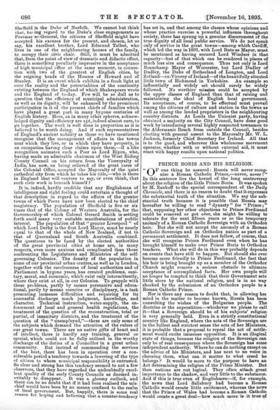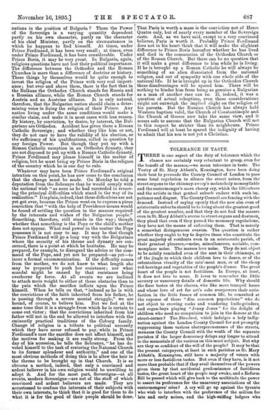PRINCE BORIS AND HIS RELIGION.
" OF one thing be assured : Russia will never recog- nise a Roman Catholic Prince,—never, never !" In this sentence lies the kernel of the long controversy about the religion of the little Prince Boris. It was spoken by M. Zankoff to the special correspondent of the Daily Chronicle, and there is no reason to doubt that it expresses the substantial truth of the situation. We say the sub- stantial truth because it is possible that Russia may hereafter be willing to read " dynasty " for " Prince ;" that, supposing her other objections to Prince Ferdinand could be removed or got over, she might be willing to tolerate for the next fifteen years or so the temporary anomaly of a Roman Catholic Sovereign with an Orthodox heir. But she will not accept the anomaly of a Roman Catholic Sovereign and an Orthodox nation as part of a permanent settlement. It does not follow, of course, that she will recognise Prince Ferdinand even when he has brought himself to make over Prince Boris to Orthodox teachers. What she will do in this way probably depends on events that have still to happen. But should she ever become more friendly to Prince Ferdinand, the fact that his heir is being brought up as a member of the Orthodox Church might remove a serious obstacle to ultimate acceptance of accomplished facts. Her own people will no longer be tempted to think that their Government sets little store by the national religion, and is in no way shocked by the submission of an Orthodox people to a Roman Catholic Prince.
Nor is there any reason to doubt that, in allowing het mind in the matter to become known, Russia has been consulting the wishes of the Bulgarian people. The doctrine or the superstition—whichever we please to call it—that a Sovereign should be of his subjects' religion is very generally held. Even in a strictly constitutional country like England, where the acts of the Sovereign are in the fullest and strictest sense the acts of her Ministers, it is probable that a proposal to repeal the act of settle- ment would excite immense opposition. It is an illogical state of things, because the religion of the Sovereign can only be of real consequence where the Sovereign has some independent authority. Where he can do nothing except on the advice of his Ministers, and has next to no voice in choosing them, what can it matter to what creed he belongs ? It would be more to the purpose to have an Act determining the religion of the Prime Minister. But then nations are not logical. They often attach great importance to the shadow, and very little to the substance. And if this is true even of Englishmen—if, for example, the news that Lord Salisbury had become a Roman Catholic would create little excitement, whereas the news that the Prince of Wales had become a Roman Catholic would create a great deal—how much more is it true Of nations in the position of Bulgaria ? There the Power of the Sovereign is a varying quantity dependent partly on his own character, partly on the character of his chief ,Minister, partly on the circumstances in which he happens to find himself. At times, under Prince Ferdinand, it has been very small ; at times, even under Prince Ferdinand, it has been considerable. Under Prince Boris, it may be very great. In Bulgaria, again, religious questions have not lost their political importance. The difference between the Orthodox and the Roman Churches is more than a difference of doctrine or history. These things by themselves would be quite enough to invest the religion of the Prince with very real import- ance; but over and above them, there is the fact that in the Balkans the Orthodox Church stands for Russia and a -Russian alliance, while the Roman Church stands for Austria and an Austrian alliance. It is only natural, therefore, that the Bulgarian nation should claim a deter- mining voice in fixing the religion of their Prince. Any nation living under the same conditions would make a similar claim, and make it in most cases with less reason. By history, by conviction, by desire, by interest, the Bul- garians are Orthodox. Accident has given them a Roman Catholic Sovereign ; and whether they like him or not, they do not care to have the validity of his election, or the sufficiency of his qualifications, called in question by any foreign Power. But though they put up with a Roman Catholic exception in an Orthodox dynasty, they are not disposed to put up with a Roman Catholic dynasty. Prince Ferdinand may please himself in the matter of religion, but he must bring up Prince Boris in the religion of the country which he is one day to rule.
Whatever may have been Prince Ferdinand's original intention on this point, he has now come to the conclusion that the change must be made. On Monday he told a deputation from the Sobranye that he would comply with the national wish "as soon as he had succeeded in remov- ing the principal difficulties which stand in the way of its realisation." Itisplain, indeed, that these difficulties are not yet got over, because the Prince went on to express a pious conviction that "with the help of Providence means would be found of settling the question in the manner required by the interests and wishes of the Bulgarian people." Something, therefore, still stands in the way ; though whether that something is the Pope or the child's mother does not appear. What real power in the matter the Pope possesses it is not easy to say. It may be that though Prince Ferdinand will go a long way with the Bulgarians where the security of his throne and dynasty are con- cerned, there is a point at which he hesitates. He may be prepared, for example, to disregard the advice or the com- mand of the Pope, and yet not be prepared—as yet—to incur a formal excommunication. If the difficulty comes from the mother, we do not know to what length she may be prepared to push her resistance ; nor what scandal might be caused. by that resistance being overborne by force. At all events we are inclined to attach more weight to either of these obstacles than to the pain which the sacrifice inflicts upon the Prince himself. When he tells us that, "imbued as he is with the convictions of the faith inherited from his father, he is passing through a severe mental struggle," we are bound, of course, to believe him. But we feel at the same time that it is a struggle from which he is certain to come out victor ; that the convictions inherited from his father will not in the end be allowed to interfere with the eminently practical traditions of the Coburg Change of religion is a tribute to political necessity which they have never refused to pay, while in Prince Ferdinand's case the sacrifice does not affect himself, and the motives for making it are really strong. From the day of his accession, he tells the Sobranye, "he has de- voted himself to the task of restoring the National Church to its former splendour and authority," and one of the most obvious methods of doing this is to allow the heir to the throne to be brought up in that Church. It is so obvious a method, indeed, that only a convinced and ardent believer in his own religion would be unwilling to adopt it. And for the most part, Sovereigns—at all events, modern Sovereigns—are not of the stuff of which convinced and ardent believers are made. They are accustomed to confuse the interests of their subjects with their own interests, to think that it is good for them to do what it is for the good of their people should be done. That Paris is worth a mass is the conviction not of Henri Quatre only, but ofnearly every member of the Sovereign caste. And, as we have said, except to a very convinced believer, Paris is worth it. Probably Prince Ferdinand does not in his heart think that it will make the slightest difference to Prince Boris hereafter whether he has lived and died in the communion of the Orthodox Church or of the Roman Church. But there can be no question that it will make a great difference to him while he is living. If he is brought up a Roman Catholic he will always be something of an alien dissociated from the national religion, and out of sympathy with one whole side of the national life. If he is brought up in the Orthodox Church these disadvantages will be spared him. There will be nothing to hinder him from being as genuine a Bulgarian as a man of another race can be. If, indeed, it was a question of actual rebaptism, even these considerations might not outweigh the implied slight on the religion of his parents. But the Russian Church has always held Western baptism valid, the Church of Constantinople and the Church of Greece now take the same view, and it seems safe to assume that the Bulgarian Church will not in this respect be stricter than its neighbours. Prince Ferdinand will at least be spared the indignity of having to admit that his son is not yet a Christian.



















































 Previous page
Previous page